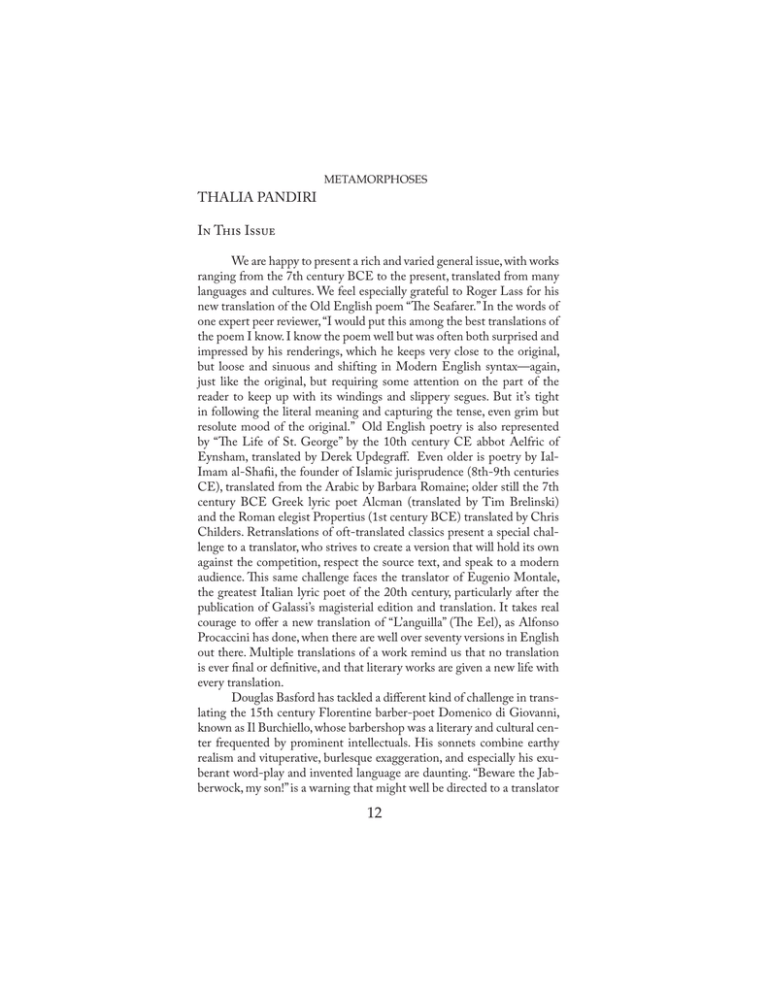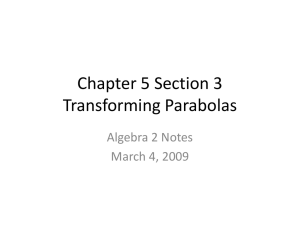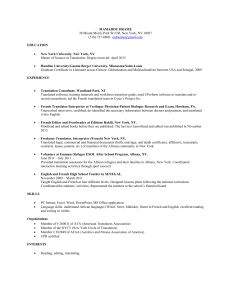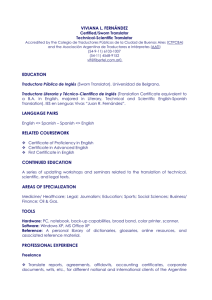THALIA PANDIRI In This Issue
advertisement

METAMORPHOSES THALIA PANDIRI In This Issue We are happy to present a rich and varied general issue, with works ranging from the 7th century BCE to the present, translated from many languages and cultures. We feel especially grateful to Roger Lass for his new translation of the Old English poem “The Seafarer.” In the words of one expert peer reviewer, “I would put this among the best translations of the poem I know. I know the poem well but was often both surprised and impressed by his renderings, which he keeps very close to the original, but loose and sinuous and shifting in Modern English syntax—again, just like the original, but requiring some attention on the part of the reader to keep up with its windings and slippery segues. But it’s tight in following the literal meaning and capturing the tense, even grim but resolute mood of the original.” Old English poetry is also represented by “The Life of St. George” by the 10th century CE abbot Aelfric of Eynsham, translated by Derek Updegraff. Even older is poetry by IalImam al-Shafii, the founder of Islamic jurisprudence (8th-9th centuries CE), translated from the Arabic by Barbara Romaine; older still the 7th century BCE Greek lyric poet Alcman (translated by Tim Brelinski) and the Roman elegist Propertius (1st century BCE) translated by Chris Childers. Retranslations of oft-translated classics present a special challenge to a translator, who strives to create a version that will hold its own against the competition, respect the source text, and speak to a modern audience. This same challenge faces the translator of Eugenio Montale, the greatest Italian lyric poet of the 20th century, particularly after the publication of Galassi’s magisterial edition and translation. It takes real courage to offer a new translation of “L’anguilla” (The Eel), as Alfonso Procaccini has done, when there are well over seventy versions in English out there. Multiple translations of a work remind us that no translation is ever final or definitive, and that literary works are given a new life with every translation. Douglas Basford has tackled a different kind of challenge in translating the 15th century Florentine barber-poet Domenico di Giovanni, known as Il Burchiello, whose barbershop was a literary and cultural center frequented by prominent intellectuals. His sonnets combine earthy realism and vituperative, burlesque exaggeration, and especially his exuberant word-play and invented language are daunting. “Beware the Jabberwock, my son!” is a warning that might well be directed to a translator 12 FALL 2015 of Il Burchiello’s sonnets into English. (And how would one translate “’twas brillig, and the slithy toves...” or “all mimsy were the borogoves...”?) For many of our readers, this is probably the first glimpse of the fascinating, and influential work of an inventive poet who consistently stretches the limits of the sonnet. Prose selections translated from Italian provide three very different perspectives. The Italian-Jewish writer Augusto Segre was born in a northern Italian town in 1915, studied in Rome in the 1930s, and fought with the Partisans in 1944. A Zionist as well as an antifascist, he retired to Jerusalem in 1978 after a distinguished university career in Rome. “Jachetu’s Ring” is one of the stories he wrote about life in a Jewish ghetto in the early twentieth century, translated here by Steve Siporin. Stefano Benni was born in 1974, and his “Autogrill Horror” (translated by Amelia Linsky) is a condemnation of a consumerist society, written with the sharp, observant eye, the unerring ear for colloquial speech, the grim humor, and the surrealist twists I associate with Stephen King at his best, in his short fiction. Benni’s range of registers—switching from the banal and quotidian to a high-flown adjective or turn of phrase in a single sentence; his impeccable sense of rhythm; his inventive coining of new compound words; his mischievous word-play, all make a translator feel a translation is never done. This story has not been translated into English before; we know you will enjoy it, especially any of you who have traveled in Italy and stopped at an Autogrill on some highway. Another view of contemporary Italian life and culture comes from Marcello D’Orta’s two best-selling collections of compositions written by his elementary school pupils in Naples and in the small Neapolitan town of Azano. Lydia Miranda Oram presents the first English translation of some of these gems, faithful to the orthographic and semantic idiosyncrasies of the original Italian and to the logic, curiosity and sometimes pithy wisdom of the children who are trying to make sense out of their own impoverished surroundings and the history, geography and Bible lessons they encounter in school; they succeed more than most adults. The French-speaking world is represented by a particularly wide range of poetry and prose. Medieval French scholar Samuel Rosenberg has translated a series of popular Gascon songs (collected and published by Jean-François Bladé in in 1880s). John Anson provides an accomplished and clever new translation of a poem by symbolist Paul Valéry, who published his best work as a poet in the early 1920s. Contemporary poets include Haitian-born Marie-Célie Agnant, who has been living in Montreal since 1970 (translated by Corine Tachtiris); Emmanuel 13 METAMORPHOSES Merle (translated by Jennifer Barber; and the Lebanese French writer Amin Maalouf, of transnational fame, who was born in Beirut but writes in French and who is the first Lebanese to be elected to the Académie française as one of the “immortals,” filling the seat left vacant by the late Claude Lévi-Strauss. We offer Maalouf ’s “Quatre moments” (“Four Moments”), introduced and beautifully translated by Patricia Frederick. From Martinique, we have an excerpt from the opening chapter of Ravines of Early Morning, a novel by the Martiniquan writer Raphael Confiant, a prolific novelist known for his commitment to Créolité, who writes in French and Martiniquan Creole. Patricia Hartland conveys the code-switching and the rich, inventive language of Confiant’s characters. A real discovery for me was Henri Bosco (1888-1976). Perhaps at least some of our readers are familiar with his work: he was a very prolific author and won many prizes. Born in Avignon to a family of Piedmontese origins, he often took Provençal life as the theme of his literary work. Joyce Zonana, who is completing a translation of his 1948 novel Malicroix, has given us a superbly translated excerpt from the novel’s opening chapter, which I believe will entice reader to discover more of this novel and of Bosco’s other works. Diversity characterizes poetry and prose translated from Portuguese. Award-winning translator of Portuguese and Spanish poetry Alexis Levitin brings us several poems by the popular contemporary Brazilian poet Salgado Maranhão. Rosalia Garcia’s translation of a gaucho tale (“Marshland”) by Joāo SImões Lopes Neto (1865-1916) was another discovery not only for me but for one of the peer reviewers. Born near Pelotas, in the southernmost state of the southern region of Brazil, he was very active in his community and in local politics; as a writer, he aimed to preserve the history and culture of the Rio Grande do Sul with stories of gaucho life. Garcia captures the register and dialect of the Portuguese, in this riveting and brutal short story. From a distant part of the world, Paul Melo e Castro translates a short story from Goan Portuguese, “The Bangle Seller” by Maria Elsa da Rocha (1924-2005). One of the last Portuguese language Goan writers, she was a primary school teacher who published short stories in local newspapers and was also featured on a radio broadcast following the integration of Goa into India. Ulalume Gonzalez De León was born in Uruguay in 1932 but became a naturalized Mexican citizen in 1948. Octavio Paz called her “the best Mexican poet since Sor Juan Ines de la Cruz.” She is translated here by the team of Terry Ehret, John Johnson, and Nancy Morales. Endre Ady (1877-1919), the poet whose 1906 volume of poems 14 FALL 2015 revolutionized Hungarian poetry, is translated by Paul Sohar. Avrom Sutzkever (d. 2010), who has been called by some “the greatest Jewish poet of his time,” is translated here from the Yiddish by Zackary Sholem Berger. The team of poet-translators, Barbara Siegel Carlson and Ana Jelnikar return to our pages with more poems by Srečko Kosovel, translated from the Slovene. Kosovel, one of Slovenia’s first modernists, was born near Trieste and raised in the desolate Karst region of Slovenia. It never fails to amaze me that his powerful poetry was written by such a young man: he died in 1926 at the age of 22. Russian poetry in this issue ranges from Brendan Kiernan’s translation of the first canto of Rossiyada, an epic poem celebrating the victory of Ivan the Terrible over the Mongols in 1522, by Mikhail Matveyevich Kheraskov (1733-1807) to Larisa Emilyanovna Miller (translated by Rebecca L. Thompson), who was born in 1940, published over twenty volumes of poetry and prose, and was awarded the Tarkovsky Prize in 2013, and to Slava Nurgaliev, who was born in Moscow in 1964, moved to Germany in 1997, and now divides his time between Russia and Austria, teaching in both countries. Yevgeniy Sokolovsky translates one of his poems in this issue. From Russia’s neighbor Finland we have a laconic short story from the prolific author Petri Tamminen, translated by Jill Timbers. We are particularly grateful for this submission because we have a dearth of translations from the Finnish—a real shame, given some of the breathtaking prose, and especially poetry, written in Finnish in recent decades. Denmark is represented here by one prose piece and by three contemporary poets: Marianne Koluda Hansen (1951-2014, translated by Michael Goldman), Vita Andersen and Per Aage Brandt, the latter two both born in 1944 and translated, respectively, by Ingrid Lansford and Thom Satterlee. Hansen’s self-ironic view of life from the perspective of a middleclass woman rings true and is captivating; Andersen’s poetic voice, while different, seems to address the same reality. Brandt is not only a poet but a widely-published academic whose field is cognitive semiotics. His is a very different voice, elusive and allusive. The poems sit on the page self-contained and lapidary, small blocks of speculation. The short story (translated by Ingrid Lansford) is by poet and prose writer In Michael. “The Source” is arguably an example of magical realism, but it seems more slippery, mysterious and grim than the kind of magical realism Gabriel Garcia Marquez made familiar to American audiences. Michael’s short stories always seem to me to be one misstep away from horror—but they never quite slip into the abyss. Two short stories translated from the 15 METAMORPHOSES German also partake of the mysterious and fantastic. Paul Scheerbart’s “Malwi the Helmsman: A Vesta Novelette” (translated by Joel Morris) was published in 1912, as science fiction. Franz Fühmann (1922-1984) was born in Czechoslovakia, served in the German army in WWII and was a Soviet POW; after the war he returned to Germany and lived in the GDR until his death in 1984. His “The Street of Perversions” (translated by Andrew Hamilton) is a work of political and cultural criticism presented through the lens of science fiction. From the Arab world, in addition to the classical poetry of alImam al-Shafii and Amin Maalouf ’s poetry in French, we have the Palestinian poet Ashraf Zaghal, who was born in Jerusalem in 1974 and has lived in Palestine, the USA, and Canada; he holds a doctorate in Water Resources Engineering from the University of Guelph (Canada) and is employed as an environmental scientist. His powerful political poem is translated by Ghada Mourad. Nesreen Akhtarkhavari offers a masterful translation of the renowned Jordanian poet Tayseer al-Sboul (19391973). Ibrahim Samuel was born in Damascus in 1951 and graduated from the University of Damascus. He has published five collections of short stories that were very well received and earned him distinction. He was imprisoned twice for political activities and spent some years in jail. His (Christian-Syrian) short story “That Sunday Morning” is translated by Tarek Shamma. South Asian poetry and prose selections include poetry by the preeminent and most loved Bengali poet after Rabindranath Tagore, Jibanananda Das (1899-1954), translated from the Bengali by Srinjay Chakravarti; a melancholy and moving short poem by Bhaskar Chakraborty (1943-2003), one of the leading poets of Kolkata, translated from the Bengali by Manash Bhattacharjee; a riveting short story with a shocker of an ending (“God Save Us From Our Sins”) by Saadat Hasan Manto (1912-1955), translated from the Urdu by Aftab Ahmad and Matt Reeck. Finally, from Southeast Asia, two stories by Nh͍t Linh (1906-1963), who was a writer, editor and publisher in colonial Hanoi. His career in the turbulent political environment of Viet Nam was marked by violent reversals of fortune, and at times by persecution and imprisonment. He committed suicide by cyanide in 1963 as an act of political protest. The stories in this issue, “Two Sisters” and “Half Dead” were published in 1936; they are translated by Quan Manh Ha. 16 FALL 2015 FORTHCOMING 2016 will see a special double issue dedicated to contemporary Brazilian prose; each translated selection is accompanied by a critical essay. This issue was initially organized by Aileen El-Kadi and is guestedited by Marguerite Harrison. We are already receiving submissions for a Spring 2017 general issue. Thus far we have translations from German, French, Japanese and Spanish. We have accepted a short story by Rodolfo Walsh, “Footnote,” a tour de force translated by Sergio Waisman. We have tentative plans for a special Chinese issue in the more distant future. THANKS We are grateful to all the authors, translators, publishers and other rights holders for permission to publish the material in this issue. We also owe a debt of gratitude to those who submit their work, to our individual subscribers and the institutional subscribers who make the journal available to a broader readership, and to the institutions whose subventions help make possible the continued publication of Metamorphoses: Five Colleges, Inc., Amherst College, Hampshire College, Mount Holyoke College, Smith College, The University of Massachusetts Amherst, and the Translation Center at the University of Massachusetts Amherst. We are most especially grateful to the contributing editors and to the anonymous expert peer reviewers without whose knowledge, wisdom and generosity we could not survive. You know who you are, and how greatly you are appreciated! I would also like to thank the student interns whose work is crucial: Production Editor Rebecca Lee, and editorial interns Yvie Yao, Elliott Farquhar and Isabella Levy, who has also performed the thankless task of updating our website. Thank you also to Chrissie Bell for her efficient, thoughtful and always gracious administrative help. Northampton, MA June 2015 17




